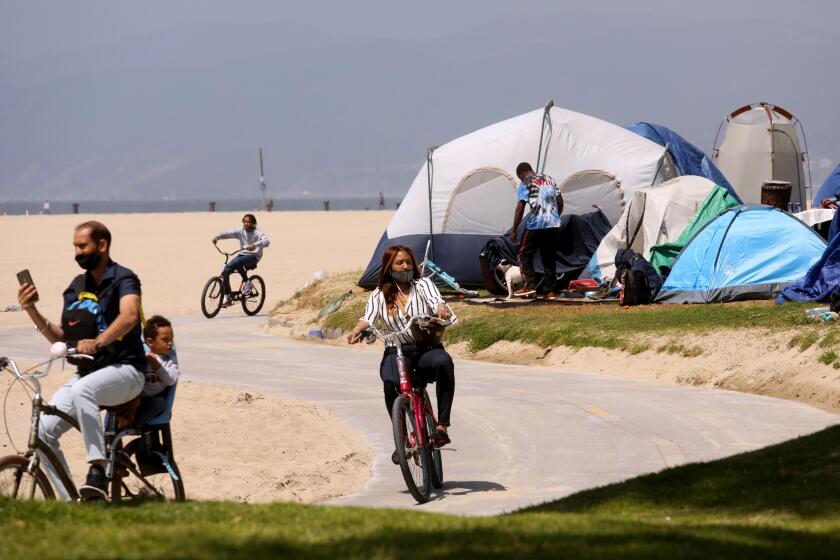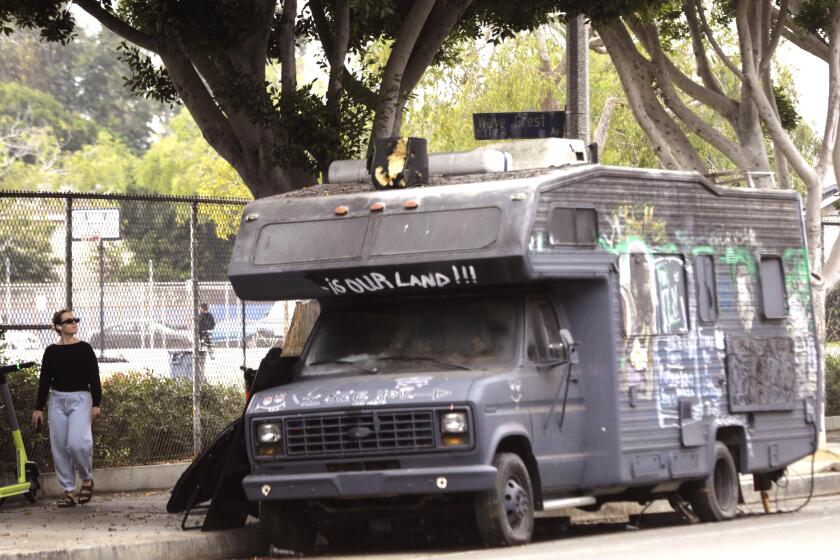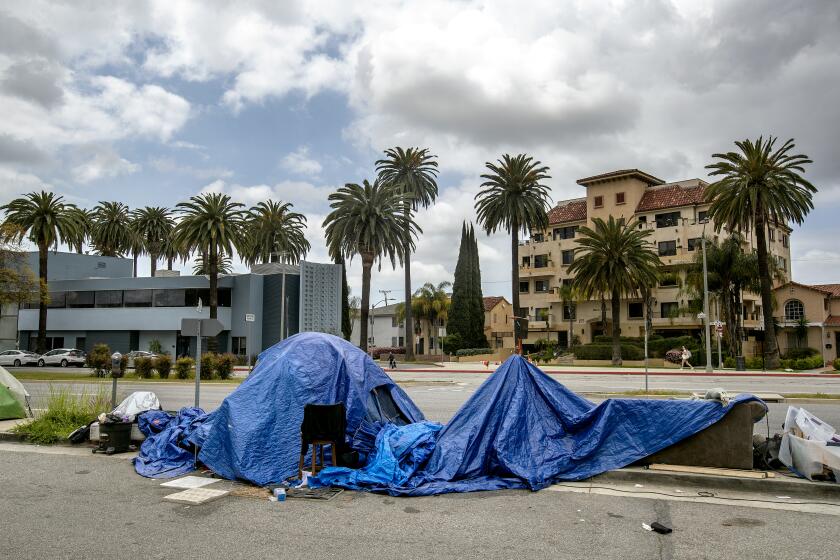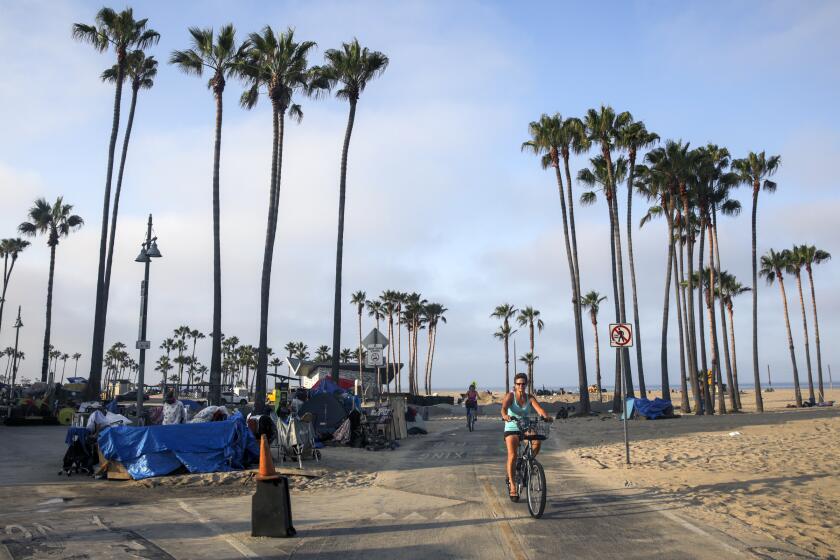Opinion: A job can’t always lift someone out of homelessness. What more is needed?

- Share via
Having one job doesn’t guarantee you’ll be able to find another one. Having a job doesn’t ensure you’ll be able to afford a home. And the worst trouble comes when you slip across that line and no longer have a job or a home — at which point it seems to take a miracle to get those things back. This spring I spoke with two unhoused men in my Venice neighborhood who are trying to find ways to get off the street, and to one man, Mike, who did find a way out. In his case, it ultimately was not employment alone that made the difference, but a modest safety net. Mike’s journey offers an example of possible solutions to the problem we now face in Los Angeles County, living with an unhoused population of more than 75,000 people. Mike, Andrew and Samuel agreed to share their stories with the Los Angeles Times on the condition that their last names not be used. — Robert Karron
Andrew
My name is Andrew, and I’m 53 years old. I’m from Kennebunkport, Maine. We started out very wealthy and we became very poor, from the second-best house on the block to the smallest apartment. My dad went away. I’m the ninth of 10 kids. Three were still in the house when my mom realized she had to get a job as a secretary. I worked, too. By high school I was scooping ice cream at Ben & Jerry’s, spinning records at WBLM, working for a ferry service as a deckhand, and, for a while there, I was even a mail carrier.
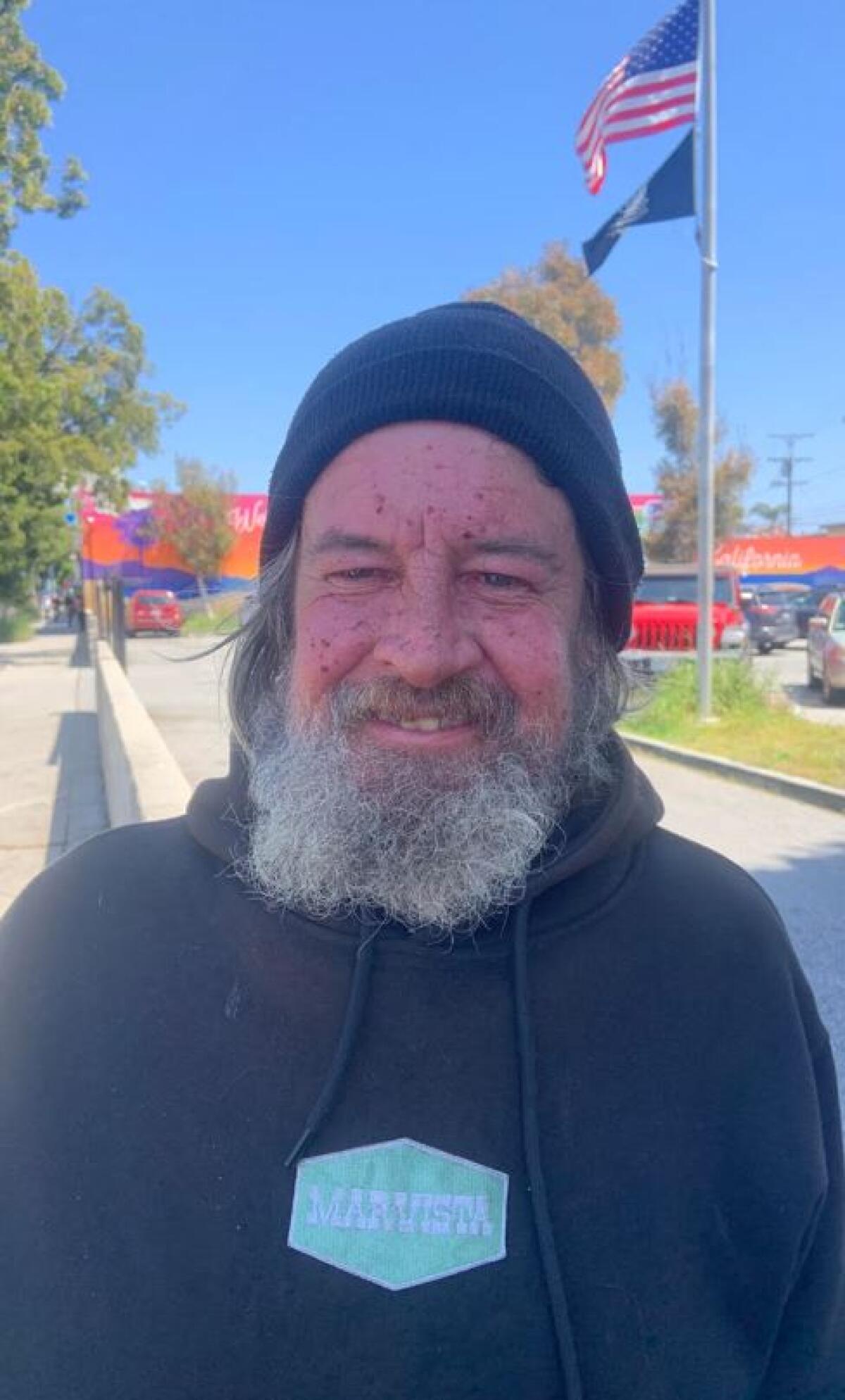
I didn’t like school. I didn’t want to learn what they wanted me to. Progressive schools, where you learn in nature? The closest I ever came to that was at Camp Chewonki, in Wiscasset. I loved it. I went there for two summers. I learned about boats. It was great. I wish I’d gone to school in a place like that.
I often hear from my unhoused neighbors that their needs are not complex. Even a modest monthly check would be transformative for many.
After high school I tried college at the University of Southern Maine, but I only liked one class, creative writing. I wrote a story in the style of Hunter S. Thompson about attending a Grateful Dead concert. My teacher was crazy about it. Said she’d never read anything like it. “Best I’ve ever seen.” But I flunked psychology, so I dropped out. I went to work for radio stations — WBLM, WMGX and WMPG. I was a disc jockey. I liked it a lot. As the ninth of 10 kids, I never had anyone to listen to me in my house. I wanted people to listen to me. I have something to say. If you get on the radio, and you learn a few things, learn how to do it, you can have your say.
When I was 23, I married my high school sweetheart, Jennifer. We’d met when we were 16. We were cast in the same play. At some point, we talked about my job at the radio station. Could I depend on it? She said: “It’s a shame you’d never join the Army.” Her dad was in the Army. I said: “Who says I wouldn’t join the Army?” So I joined, as a radio journalist.
As the ninth of 10 kids, I never had anyone to listen to me in my house. I wanted people to listen to me. I have something to say. If you get on the radio, and you learn a few things, learn how to do it, you can have your say.
— Andrew
Good people have served in that post: Pat Sajak, Earl Woods, Hunter S. Thompson. I was proud to join that select group. I was mainly out of combat, though I did get injured in Bosnia. I was running my morning show (yes, I’ve seen “Good Morning, Vietnam”; I actually met that guy, Adrian Cronauer), and some crazy man came up to me and cut my nose open; that’s how I got this scar. After four years in the Army, I just went back to radio. My wife and I had a good 10 years. We had two boys. They’re grown now. We moved to Kansas at one point. I was in radio the whole time. It’s the only job I’ve ever had. Yes, I still have an announcer’s voice! I guess it never goes away.
A majority of unhoused people in Los Angeles County live in cars, trucks or RVs. Some of them have income, just not enough to afford both rent and food.
But after 10 years I burned out on radio, and my marriage, I was slowly discovering, was poisonous. I started drinking. I became homeless in 2010.
I’ve been in and out of the Department of Veterans Affairs domiciliary. They claim to have spent $11 million on me, not that I’ve seen any of that money. But that has not worked out, because they want me to change before they house me. Is it about my drinking? I don’t actually know, to be honest. You’d have to ask them. What I do know is that my contributions to the American flag are worth zilch.
Samuel
My name is Samuel, and I’m 41 years old. I was born in Fort Lauderdale, Fla., but when I was 3 my mother moved us to Tennessee, where she’s from — Covington. My dad stayed in Florida. They’d met in college, but after I was born they broke up. I grew up in Covington. That’s where I learned about the world. I had problems communicating with my mother. There were misunderstandings between us. She couldn’t reach me. I think it had to do with her being a female and me being a male. Would it have been better if my dad had been there? Possibly.
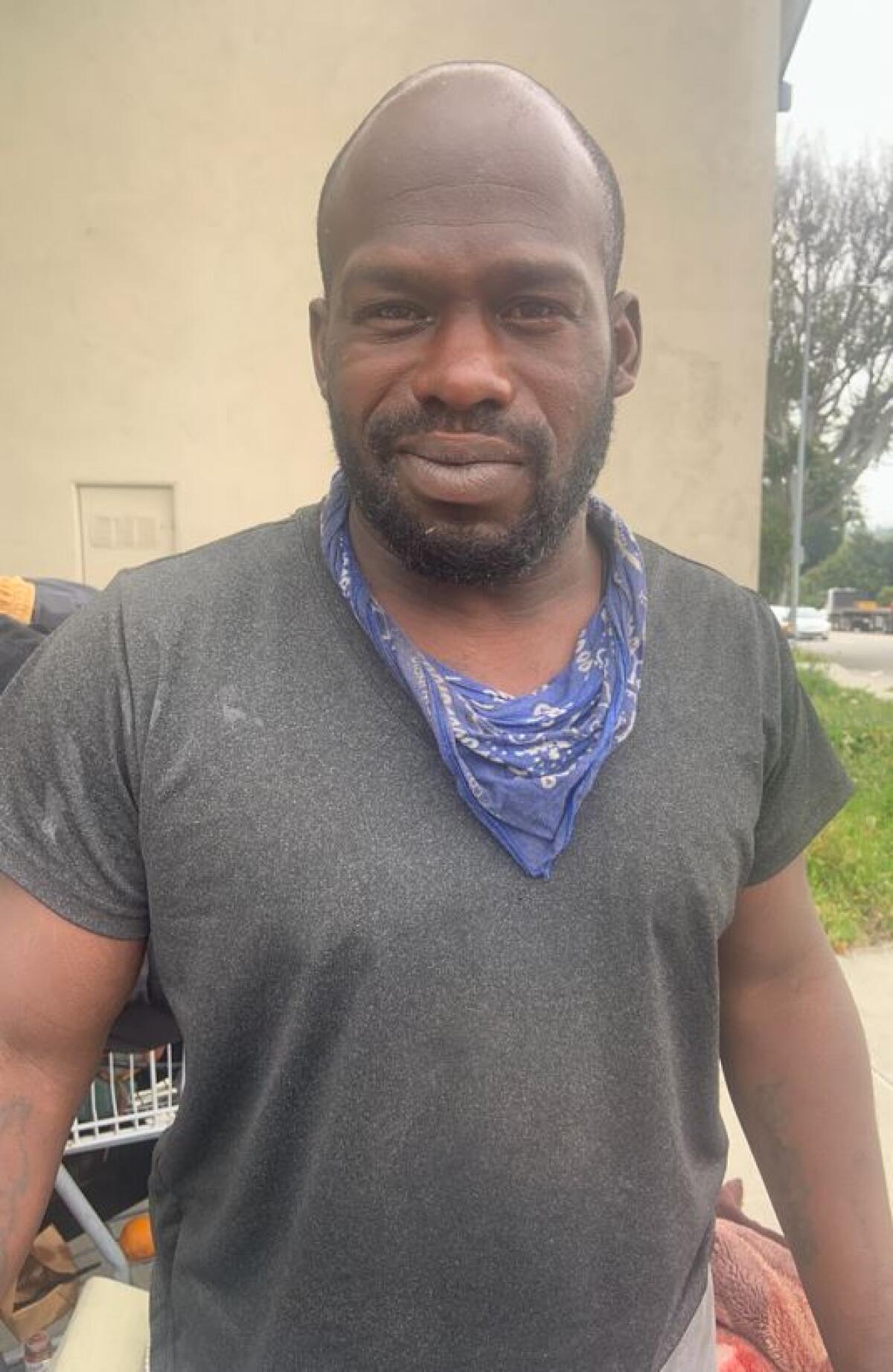
I played football — noseguard. We actually went to state finals my senior year. We lost. We got beat so bad! We didn’t even score. We were the best offense in the state, and they shut us down. … After high school, I tried community college, but it was the same as going to elementary school for me. It was redoing math and redoing English, all over again. I fell asleep most days. I only lasted a few months. Then I started working.
First it was for a company that refurbished Xboxes and laptops. I was a forklift driver. I did that for seven years. This was in Memphis. I had an apartment, and I was taking care of my girlfriend and her kids. I tried to be a father to them, but I ended up having issues with her, same as with my mother. She tried to communicate with me, and I’d shut down. She wanted me to spend more time with her and the kids. It wasn’t that I didn’t want to, but after working all day it could get frustrating. She’d want to talk about it. I’m not that big a talker. She’d get upset.
Jermaine, Jason and John all landed on the streets when they were squeezed between high housing costs and low incomes. What could have kept them in their homes?
After that job I had other forklift jobs here and there. Some let me go when I didn’t make it in on time, and some let me go because they were downsizing. Eventually I moved back to Florida, to be with my half brother, my father’s other son. He had a job installing hurricane-impact windows, and he took me on as a partner. That lasted about a year, but my mother kept calling me, wanting me to come back to Tennessee. I’m 30 at this point. I go back, but there’s no place for me to stay, so I end up moving between my cousins’ houses, which caused some confusion. They didn’t know me. I’d be out all night, and they’d get upset about it. “My house, my rules.” But I’m 30. I want to live my own life. They were worried I was running with gangs, I think, but I wasn’t.
A guy I knew from way back offered me a job in Yuma, Ariz. I did not realize it was so hot there. It’s a nice city, but the heat is the thing. We made windows. We shipped them to other places, like Hawaii. It was a good business, but it turned out to be seasonal. After a few months they released me — more downsizing. They told me to wait around for the next season, but that seemed crazy to me. One of the guys I was working with told me to try California. There were more opportunities here. He bought me a bus ticket and gave me some money. I came out in 2016. I haven’t found work yet, and, since then, I’ve been on and off the streets. I was on general relief for nine months, and in transitional housing for nine months too, but, more or less, I’ve been on my own. I’m still trying to find a job, but it’s hard without a residence. And I can’t afford a residence without a job. I make some money now, recycling. I make between $10 and $20 a day. That keeps me going. In terms of jobs, they’re hiring younger people now. I’m getting older. I’m not sure they’d want to hire me anymore.
“I tried community college, but it was the same as going to elementary school for me. It was redoing math and redoing English, all over again. I fell asleep most days. I only lasted a few months. Then I started working.”
— Samuel
I know a few people who let me use their shower. I shower maybe one to two times a month. I don’t want to be too much of a hassle. One thing I’ve learned out here is that life is fast. Things can change quickly. You don’t stay on it, you could lose a lot. You could be right back at Point A, instead of at Point Z.
Mike
My name is Mike, and I’m 65 years old. I was born in Chicago. In high school, I was good at math, so I went to Southern Illinois University. Though I quit a few times to play in bands, eventually I got an electrical engineering degree — for me, the easiest degree I could get. I play guitar, bass and ukulele. I had a few DUIs, so Illinois wouldn’t give me a driver’s license, but when I came here I could get one because back then the states didn’t exchange information.
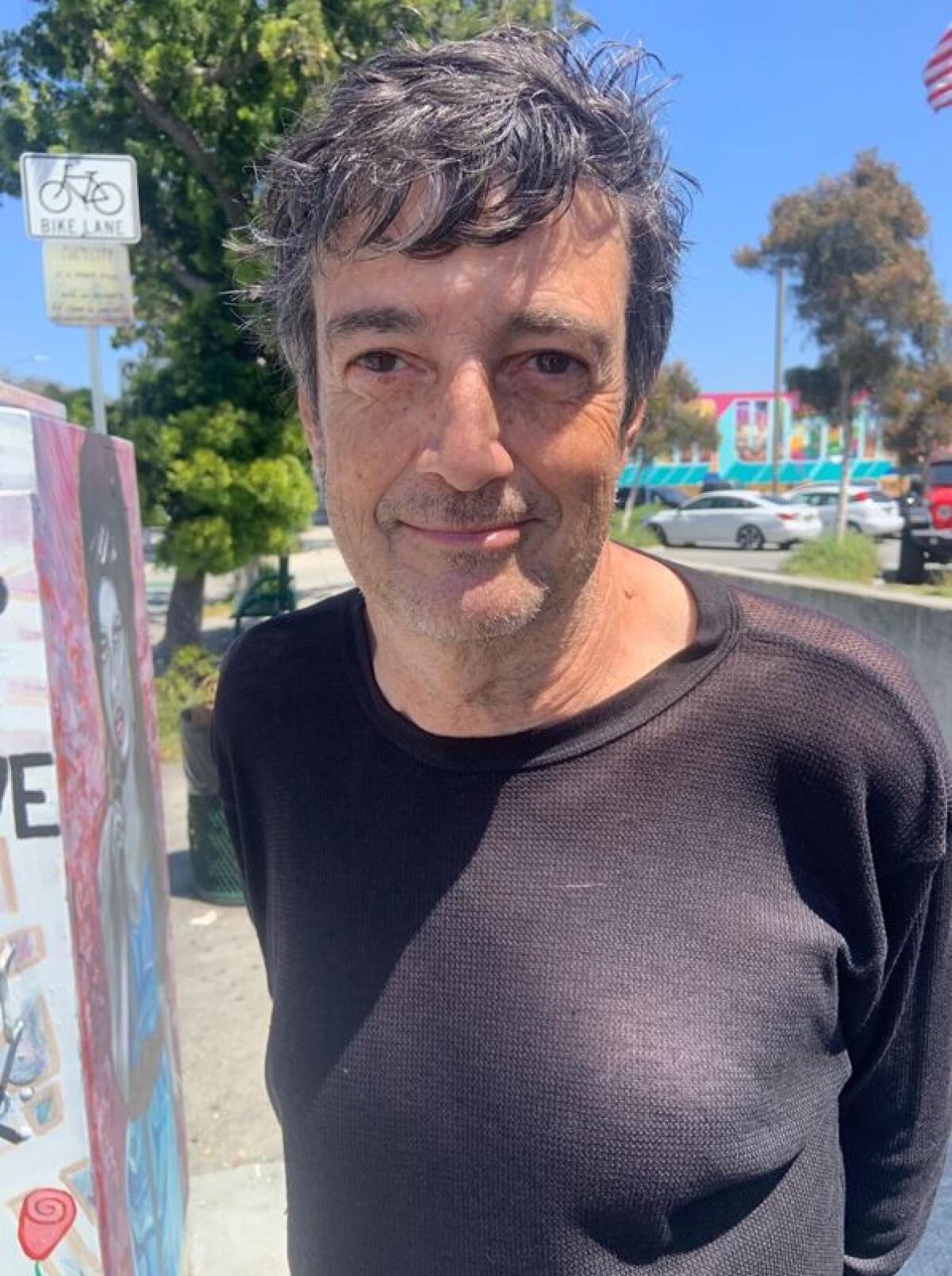
I got a job programming flight simulators for the Navy. Then I got married to a friend of my cousin’s. I actually met her on my first day here, but we didn’t start dating until a year later. I was 26 and Jean was a few years younger. We were married for eight years. The first six were awesome. But I always wanted to play in a band, and she never wanted me to. We got unmarried. (No kids — probably a good thing; I’m not the most responsible adult.)
Andromeda, Erica and Heidi have gotten by for years on the street. Sometimes government helps them, but at other times it makes their lives harder.
I switched jobs and started working for a recording studio in Hollywood. I fixed things for them. Then I moved to Nashville and worked for the audio engineering company JBL, servicing mixing consoles. I was working a lot. I started taking my friend’s ADHD medication, so I could stay awake and still play in bands at night. After two years, they transferred me back here. At some point I opened my own recording studio, while still working for JBL. I’d be at the job all day and then the recording studio all night. I had to stay awake, but I no longer had access to my Nashville friend’s ADHD medication. I started taking meth. Where did I get it? I hang out with musicians!
At first, I thought, I’ll just do this until we get the studio set up. That was in 1997. Crystal meth is really addictive. I was on it for 27 years. At one point I was spending a couple hundred dollars a week, which was about what I was making. I just quit five years ago.
Like so many of L.A.’s 41,980 unhoused residents, Patrick, Shane and Crystal were on a different path until things fell apart.
I was a functional drug addict. I had jobs the whole time. Eventually I left to work on my own, fixing people’s equipment. I had a girlfriend. I was living with her in the Palisades. I was lying to her. I kept telling her I was quitting. I was quitting — every couple of weeks. But quitting drugs is not the same thing as not doing drugs. It’s hard. … At some point she’d had enough. She told me I needed to find another place. I started living in my car. I had a small SUV, so I’d flip the seat down and use a sleeping bag. I had my bass amp and my guitar and ukulele with me. Sometimes I’d practice in there.
Even then I had a key to my ex-girlfriend’s house. She told me I could take a shower any time I wanted. She’s still one of my best friends; I owe her so much. … I had other friends who’d make me dinner, let me take showers at their places. I kept myself clean. I disguised the fact that I was homeless. When I told people, they were shocked.
I’d be at the job all day and then the recording studio all night. I had to stay awake, but I no longer had access to my Nashville friend’s ADHD medication. I started taking meth.
— Mike
Drugs consume you. You don’t think it’s your fault. People around you can see you’re messing up your life, but, if you’re on drugs, you think: No, this is right. Even though it’s not. In retrospect, I’m like: What was I thinking? But at the time I couldn’t see it. I didn’t try to quit for 10 years. Then I did try. Quitting took me 17 years. You last a week here, a few days there. What finally did it was one day I was waiting for my drug dealer. He was an hour and a half late. I thought, This is stupid. I crawled back in my car and fell asleep for two days. I woke up. I thought: It’s been two days sober, maybe I can go for three. Maybe I’ll try for four. Eventually I got a calendar and started writing the number of days that I hadn’t done drugs. I got to 45, and I thought: That’s pretty good. It took a couple of years for my body to forget them, but, at this point, five years in, it’s a distant thing. I don’t think about them anymore.
I’ve been renting a house down the street for two years now. It’s really nice. I rent it with a friend who’s also a musician. There’s instruments all over the den. We’ve got drums and a PA. We jam. I’m only able to afford it because of Social Security. That and Medicare were the game changers. Until two years ago, I was still in my car even though I was off drugs. Between Social Security and what I make from odd jobs — a few hundred a week — I can support myself.
Robert Karron teaches English at Santa Monica College. @robertkarron
More to Read
A cure for the common opinion
Get thought-provoking perspectives with our weekly newsletter.
You may occasionally receive promotional content from the Los Angeles Times.
